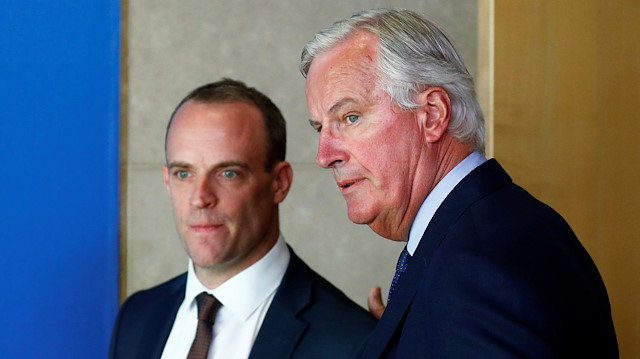
On Oct. 13, the technical experts hammering out the details of the pact -- Barnier's deputy Sabine Weyand and May's adviser Oliver Robbins -- arrived at a draft deal that addressed fears of disruptive checks on the Irish land border by promising that Britain could later negotiate an EU customs union.
This was a crucial EU concession, as Barnier noted after a new deal was struck on Wednesday, because it overrode an EU demand that Britain's province of Northern Ireland could be in a separate customs zone from the mainland if hopes for other trade accords that would keep the border open failed to materialise.
However, that Weyand-Robbins deal failed to pass muster in London and when Raab came to Brussels to kill it off on Oct. 14 he made clear that Britain needed much more of a guarantee that it would get a customs union deal as an "all-UK backstop".
The previous draft included only a commitment to work on a single customs area in the future, but no details of what that would look like. And in the event it was not agreed, Northern Ireland would have to stay in a customs union with the EU, with or without the rest of the UK.
"That was not enough for the UK government because there was no cast-iron guarantee there would not be a customs border between Northern Ireland and Great Britain," a senior EU official said on Thursday.
The negotiators went back to the drawing board. The EU had been telling London for months that it could not extend sweet terms offered to struggling Northern Ireland alone -- giving it access to EU markets -- to Europe's second biggest economy.
But, they said, if Britain accepted more EU regulation of its industries in order to counter complaints from other EU governments that it was getting a free pass, it might work.
The result was scores more pages added to the draft treaty aimed at ensuring a "level playing field" for France, Germany and the others over British industries getting custom-free access to the EU market. For good measure, and French favour, they also added demands on access to Britain's fishing grounds.
May called it the best deal available. It proved, however, to be a step too far for several of her ministers, including Raab. He resigned saying: "No democratic nation has ever signed up to be bound by such an extensive regime, imposed externally without any democratic control over the laws to be applied."
While there is speculation in London of a challenge to May and of other Britons coming back to Brussels to renegotiate, EU diplomats and officials say they could imagine yet more talks. But those EU trade-offs between rights and obligations will not change, they say, and Britons must beware Barnier's staircase.


